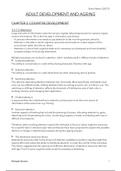Summary
Summary EXAM notes SLK 210 chapters 3,4,5,6,7 Adult development
- Course
- Psychology 210 (SLK210)
- Institution
- University Of Pretoria (UP)
Psychology (SLK 210), Section B exam notes on Adult Development and Ageing. Includes chapter 3, chapter 4, chapter 5, chapter 6 and chapter 7. All these chapters have been summarised in to a total of 56 pages. TUKS university. UP.
[Show more]




